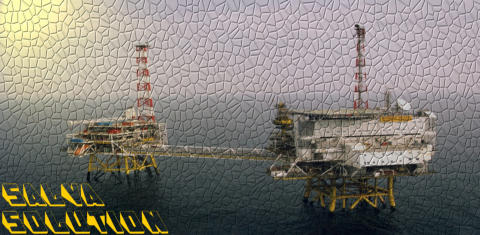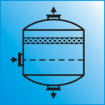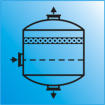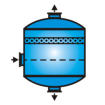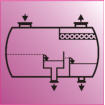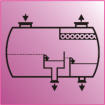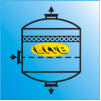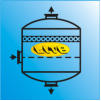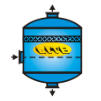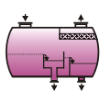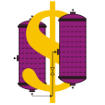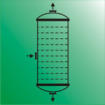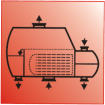Applications
Two Phase Separator Design
This
app
provides
the
optimum
two-phase
separator
design
for
the
given
process
conditions.
All
well-known
classic
methods,
i.e.
GPSA,
York
Demister,
Theoretical,
as
well
as
the
CFD-based
realistic
approach
are
included,
and
their
produced
results
can
be
compared
against
each
other.
Note,
the
popular
classic
methods
are
too
conservative
and
usually
specify
extremely
oversized
and
expensive
separators.
The
CFD-based
approach,
on
the
other
hand,
will
propose
more
economical
separators
that
can
successfully
accomplish
the
separation
task.
So,
this
app
offers
a
direct
tangible
benefit
for
industrial
design
projects.
The
app
can
be
installed
on
various
platforms:
Apple iOS Amazon Android Google Play Android
A “Lite” version of this application is also available:
Apple iOS Amazon Android Google Play Android
Apple App Demo Android App Demo
https://youtu.be/52mTwu-k42M https://youtu.be/zeX-_1nOsgY
Three Phase Separator Design
This
app
provides
the
detailed
optimum
design
of
three-phase
separators
for
any
given
process
conditions.
Both
vertical
and
horizontal
orientations
and
various
design
types,
i.e.
simple,
boot,
weir,
and
bucket
&
weir,
are
covered.
All
well-known
classical
methods,
i.e.
GPSA,
York
Demister,
Theoretical,
as
well
as
the
modern
CFD-based
approach
are
included,
and
their
produced
results
can
be
compared
against
each
other.
Optimization
methods,
such
as
golden-
section
search
and
bisection
method,
have
been
used
through
each
method
to
optimize
the
holdup/level
control
compartments.
Again,
compared
to
the
popular
classical
methods,
the
CFD-
based
approach
proposes
more
economical
separators
that
can
efficiently
accomplish
the
separation task. The app is available for various platforms:
Apple iOS Amazon Android Google Play Android
Apple App Demo Android App Demo
https://youtu.be/BaJ7yrspCIU https://youtu.be/yUNEfwwIr0U
Distillation Column Design and Cost Estimation
Design
and
cost
estimation
of
multicomponent
distillation
columns
are
conveniently
performed
through
this
swift
mobile
application
which
has
been
exclusively
packaged
for
Apple
App
Store:
Apple iOS
The
user
interface
offers
three
interactive
columns
which
provide
a
convenient
environment
for
copy-paste,
comparison,
and
sensitivity
analysis.
The
most
reliable
shortcut
methods
have
been
used
for
sizing
the
equipment
and
calculating
composition
of
top
and
bottom
products.
The
equations
and
correlations
involved
in
the
design
phase
are
Fenske,
Underwood,
Erbar-Maddox,
O'Connell,
Kirkbride,
and
Fair.
Vapor-Liquid
disengagement
area
at
top
and
liquid
residence
time
of
5
min
at
bottom
are
considered
while
calculating
the
height
of
column.
Purchased
cost
and
bare
module
cost
of
the
designed
columns
are
also
estimated
for
years
ranged
from
1957
to
present.
All
affecting
parameters,
i.e.
size,
pressure,
temperature,
materials
of
construction,
and
inflation
are
taken
into
account.
Thanks
to
incorporating
average
values
of
published
cost
data,
the estimation accuracy is at a high level of ±12%.
Apple App Demo
https://youtu.be/o1zwL6TE30A
Cost Estimation for Process Equipment
A mobile application namely “Costimator” is published for various platforms:
Apple iOS Amazon Android Google Play Android
This
application
estimates
both
the
Purchased
Cost
and
the
Bare
Module
Cost
of
process
equipment
for
any
given
year
from
1957
to
present.
For
each
piece
of
equipment,
there
are
three
interactive
columns
which
provide
a
convenient
environment
for
copy-paste,
comparison,
and
sensitivity
analysis.
All
affecting
parameters,
i.e.
type,
capacity,
pressure,
temperature,
materials
of
construction,
and
inflation
are
taken
into
account.
Thanks
to
incorporating
average
values
of
published
cost
data,
the
accuracy
of
cost
estimation
is
at
a
high
level
of
±12%.
This
application
covers
all
major
process
equipment,
i.e.
Blenders,
Centrifuges,
Compressors,
Columns,
Conveyors,
Crystallizers,
Drives
for
Pumps
and
Compressors,
Dryers,
Dust
Collectors,
Evaporators,
Fans,
Filters,
Heaters,
Heat
Exchangers,
Mixers,
Turbines,
Pumps,
Reactors,
Screens, Storage Tanks, Vaporizers, and Vessels.
Apple App Demo Android App Demo
https://youtu.be/Nt2kwO4rRf4 https://youtu.be/v59s0ro-WBE
ASME Steam Tables Calculation
Apple iOS
“Steam
Props”
calculates
thermodynamic
properties
of
steam
and
water
based
on
the
latest
version
of
Steam
Tables
published
by
ASME.
The
range
of
data
validity
with
this
app
is
the
same
as
with
ASME
Steam
Tables,
i.e.
pressure
ranging
from
0.0006117
MPa
to
22.064
MPa
for
the
case
of
saturated
steam,
and
pressure
ranging
from
0.005
MPa
to
100
MPa
and
temperature
ranging
from
33°C
to
800°C
for
the
case
of
superheated
steam.
Excellent
accuracies
of
±0.08%
and
±0.34%
are
established
for
the
results
calculated
for
saturated
and
superheated
steam
cases,
respectively.
This
app
also
supports
a
large
variety
of
units
in
addition
to
the
SI
(metric)
units
and U.S. Customary Units.
The following thermodynamic properties are covered for the saturated steam case:
Temperature,
Pressure,
Vapor
Volume,
Vapor
Density,
Vapor
Internal
Energy,
Vapor
Enthalpy,
Vapor
Entropy,
Liquid
Volume,
Liquid
Density,
Liquid
Internal
Energy,
Liquid
Enthalpy,
and
Liquid
Entropy.
Given
values
for
any
of
these
properties,
the
app
can
calculate
all
the
other
properties.
For
the
case
of
superheated
steam,
any
binary
combination
of
the
thermodynamic
properties
out
of
19
different
possible
combinations
(presented
below)
can
be
specified
to
calculate all the corresponding properties:
Temperature-Pressure,
Temperature-Volume,
Temperature-Density,
Temperature-Internal
Energy,
Temperature-Enthalpy,
Temperature-Entropy,
Pressure-Volume,
Pressure-Density,
Pressure-Internal
Energy,
Pressure-Enthalpy,
Pressure-Entropy,
Volume-Internal
Energy,
Volume-Enthalpy,
Volume-Entropy,
Density-Internal
Energy,
Density-Enthalpy,
Density-
Entropy, Internal Energy -Entropy, and Enthalpy-Entropy.





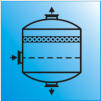
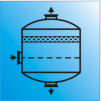
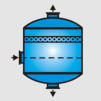
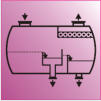
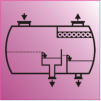
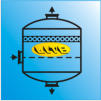
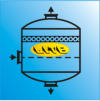
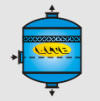

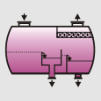
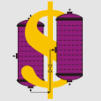

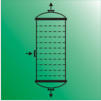
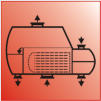

Applications
Two Phase Separator Design
This
app
provides
the
optimum
two-phase
separator
design
for
the
given
process
conditions.
All
well-known
classic
methods,
i.e.
GPSA,
York
Demister,
Theoretical,
as
well
as
the
CFD-based
realistic
approach
are
included,
and
their
produced
results
can
be
compared
against
each
other.
Note,
the
popular
classic
methods
are
too
conservative
and
usually
specify
extremely
oversized
and
expensive
separators.
The
CFD-based
approach,
on
the
other
hand,
will
confidently
propose
more
economical
separators
that
can
successfully
accomplish
the
separation
task.
So,
this
app
offers
a
direct
tangible
benefit
for
industrial
design
projects.
The
app
can
be
installed on various platforms:
Apple iOS Amazon Android Google Play Android
A “Lite” version of this application is also available:
Apple iOS Amazon Android Google Play Android
Apple App Demo: https://youtu.be/52mTwu-k42M
Android App Demo: https://youtu.be/zeX-_1nOsgY
Three Phase Separator Design
This
app
provides
the
detailed
optimum
design
of
three-
phase
separators
for
any
given
process
conditions.
Both
vertical
and
horizontal
orientations
and
various
design
types,
i.e.
simple,
boot,
weir,
and
bucket
&
weir,
are
covered.
All
well-known
classical
methods,
i.e.
GPSA,
York
Demister,
Theoretical,
as
well
as
the
modern
CFD-based
approach
are
included,
and
their
produced
results
can
be
compared
against
each
other.
Optimization
methods,
such
as
golden-section
search
and
bisection
method,
have
been
used
through
each
method
to
optimize
the
holdup/level
control
compartments.
Again,
compared
to
the
popular
classical
methods,
the
CFD-
based
approach
proposes
more
economical
separators
that
can
efficiently
accomplish
the
separation
task.
The
app
is
available for various platforms:
Apple iOS Amazon Android Google Play Android
Apple App Demo: https://youtu.be/BaJ7yrspCIU
Android App Demo: https://youtu.be/yUNEfwwIr0U
Distillation Column Design and Cost Estimation
Design
and
cost
estimation
of
multicomponent
distillation
columns
are
conveniently
performed
through
this
swift
mobile
application
which
has
been
exclusively
packaged
for
Apple App Store:
Apple iOS
The
user
interface
offers
three
interactive
columns
which
provide
a
convenient
environment
for
copy-paste,
comparison,
and
sensitivity
analysis.
The
most
reliable
shortcut
methods
have
been
used
for
sizing
the
equipment
and
calculating
composition
of
top
and
bottom
products.
The
equations
and
correlations
involved
in
the
design
phase
are
Fenske,
Underwood,
Erbar-Maddox,
O'Connell,
Kirkbride,
and
Fair.
Vapor-Liquid
disengagement
area
at
top
and
liquid
residence
time
of
5
min
at
bottom
are
considered
while
calculating
the
height
of
column.
Purchased
cost
and
bare
module
cost
of
the
designed
columns
are
also
estimated
for
years
ranged
from
1957
to
present.
All
affecting
parameters,
i.e.
size,
pressure,
temperature,
materials
of
construction,
and
inflation
are
taken
into
account.
Thanks
to
incorporating
average
values
of
published
cost
data,
the
estimation
accuracy
is at a high level of ±12%.
Apple App Demo: https://youtu.be/o1zwL6TE30A
Cost Estimation for Process Equipment
A
mobile
application
namely
“Costimator”
is
published
for
various platforms:
Apple iOS Amazon Android Google Play Android
This
application
estimates
both
the
Purchased
Cost
and
the
Bare
Module
Cost
of
process
equipment
for
any
given
year
from
1957
to
present.
For
each
piece
of
equipment,
there
are
three
interactive
columns
which
provide
a
convenient
environment
for
copy-paste,
comparison,
and
sensitivity
analysis.
All
affecting
parameters,
i.e.
type,
capacity,
pressure,
temperature,
materials
of
construction,
and
inflation
are
taken
into
account.
Thanks
to
incorporating
average
values
of
published
cost
data,
the
accuracy
of
cost
estimation
is
at
a
high
level
of
±12%.
This
application
covers
all
major
process
equipment,
i.e.
Blenders,
Centrifuges,
Compressors,
Columns,
Conveyors,
Crystallizers,
Drives
for
Pumps
and
Compressors,
Dryers,
Dust
Collectors,
Evaporators,
Fans,
Filters,
Heaters,
Heat
Exchangers,
Mixers,
Turbines,
Pumps,
Reactors, Screens, Storage Tanks, Vaporizers, and Vessels.
Apple App Demo: https://youtu.be/Nt2kwO4rRf4
Android App Demo: https://youtu.be/v59s0ro-WBE
ASME Steam Tables Calculation
Apple iOS
“Steam
Props”
calculates
thermodynamic
properties
of
steam
and
water
based
on
the
latest
version
of
Steam
Tables
published
by
ASME.
The
range
of
data
validity
with
this
app
is
the
same
as
with
ASME
Steam
Tables,
i.e.
pressure
ranging
from
0.0006117
MPa
to
22.064
MPa
for
the
case
of
saturated
steam,
and
pressure
ranging
from
0.005
MPa
to
100
MPa
and
temperature
ranging
from
33°C
to
800°C
for
the
case
of
superheated
steam.
Excellent
accuracies
of
±0.08%
and
±0.34%
are
established
for
the
results
calculated
for
saturated
and
superheated
steam
cases,
respectively.
This
app
also
supports
a
large
variety
of
units
in
addition
to
the
SI
(metric)
units
and
U.S. Customary Units.
The
following
thermodynamic
properties
are
covered
for
the
saturated steam case:
Temperature,
Pressure,
Vapor
Volume,
Vapor
Density,
Vapor
Internal
Energy,
Vapor
Enthalpy,
Vapor
Entropy,
Liquid
Volume,
Liquid
Density,
Liquid
Internal
Energy,
Liquid
Enthalpy,
and
Liquid
Entropy.
Given
values
for
any
of
these
properties,
the
app
can
calculate
all
the
other
properties.
For
the
case
of
superheated
steam,
any
binary
combination
of
the
thermodynamic
properties
out
of
19
different
possible
combinations
(presented
below)
can
be
specified
to
calculate
all the corresponding properties:
Temperature-Pressure,
Temperature-Volume,
Temperature-
Density,
Temperature-Internal
Energy,
Temperature-
Enthalpy,
Temperature-Entropy,
Pressure-Volume,
Pressure-
Density,
Pressure-Internal
Energy,
Pressure-Enthalpy,
Pressure-Entropy,
Volume-Internal
Energy,
Volume-
Enthalpy,
Volume-Entropy,
Density-Internal
Energy,
Density-Enthalpy,
Density-Entropy,
Internal
Energy
-
Entropy, and Enthalpy-Entropy.



